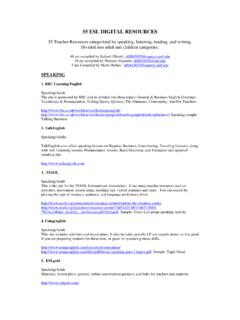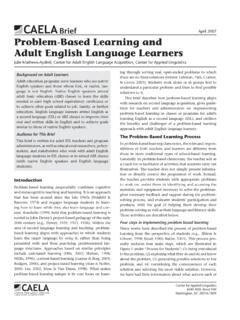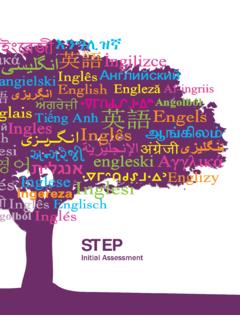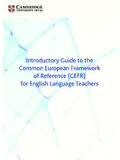Transcription of Vocabulary Learning Strategies (VLSs) Employed by …
1 english language Teaching; Vol. 12, No. 5; 2019 ISSN 1916-4742 E-ISSN 1916-4750 Published by Canadian Center of Science and Education 177 Vocabulary Learning Strategies ( vlss ) Employed by learners of english as a Foreign language (EFL) Prashneel Ravisan Goundar1 1 School of Communication, language & Literature, Lautoka, Fiji Correspondence: Prashneel Ravisan Goundar, School of Communication, language & Literature, Fiji National University, Lautoka, Fiji. Received: March 16, 2019 Accepted: April 18, 2019 Online Published: April 20, 2019 doi: URL: Abstract Learning a new language entails various challenges, one of these is grasping the Vocabulary of the language . A significant way to tackle the problem is to motivate students to become independent learners during the progression of second language (L2) Vocabulary Learning .
2 Thus, this study intended to explore the use of different Vocabulary Learning Strategies among adult english as foreign language learners and investigated the various Vocabulary Learning Strategies and found the benefits and drawbacks associated with each strategy. It was able to select the most frequently and least frequently used vlss by learners who have completed the language program and those who are continuing the course. Further, it found effective Strategies that could be used in teaching Vocabulary to students. The research used a quantitative method approach with 53 participants who were EFL learners took part in the questionnaire survey. The results of the present study reveal the common Strategies that foreign language learners use in Vocabulary Learning .
3 The vlss from this study will not only benefit students of the english language but can easily to be used by learners of other second languages globally. Finally, the paper discusses different Strategies at length, gives valuable recommendations in the discussion section and concludes with implications for future research. Keywords: Vocabulary Learning Strategies , language Learning Strategies , second language acquisition, Vocabulary Learning beliefs, english as a foreign language (EFL) 1. Introduction Engaging in Research on Vocabulary Learning Strategies The field of english as a foreign language (EFL) is enormous that comprises of various areas for example lexical components, phonetics, morphology, writing, speaking, and listening.
4 Also, all the fields have been extensively researched to focus on different Strategies which can suit the learners . Folse (2004) explains that Learning a language involves Learning numerous aspects about that language , these include its pronunciation, pragmatics, writing system, syntax, rhetorical modes for reading and composition, culture, and spelling, however the topmost aspect is Vocabulary . On the contrary, even though there has been a lot of research in the past, as early as the 1970 s on Vocabulary Learning Strategies ( vlss ), it has been challenging to conclude which strategy is the best to employ. As Wilkins (1972) lucidly puts it without grammar, very little can be conveyed, without Vocabulary , nothing can be conveyed , this simply illustrates the essence of having adequate Vocabulary nevertheless acquiring it can be very challenging; therefore, learners need to be equipped with Strategies in-order to confront this major component.
5 Vocabulary Learning strategy is considered as a tool that learners use to acquire Vocabulary . learners may employ different Learning Strategies that they assume to be an effective way of acquiring Vocabulary . Ellis (1997) states successful learners use more Strategies than unsuccessful learners . Further, the right and dynamic Strategies the learners employ influence their satisfactory academic performance . Huckin and Bloch (1993) have pointed out that research has shown that second- language readers rely heavily on Vocabulary knowledge and that a lack of Vocabulary knowledge is the largest obstacle for second language readers to overcome (p. 154). Similarly, Haynes and Baker (1993) found the main obstacle for L2 readers is not a lack of reading Strategies but rather insufficient Vocabulary knowledge in english .
6 To add on, Chamot and Kupper (1989, p. 9) define language Learning Strategies (LLSs) as techniques that english language Teaching Vol. 12, No. 5; 2019 178 students use to comprehend, store, and remember information and skills . However, Oxford (2003, p. 8) provides a more recent definition LLSs as specific actions taken by the learners to make Learning easier, faster, more enjoyable, more self-directed, more effective and more transferable to new situations ( ). Vocabulary Learning Strategies are one part of language Learning Strategies which in turn are part of general Learning Strategies (Nation, 2001). According to Nation (2001, p. 217), it is essential that a strategy must firstly involve choice, that is, there are several Strategies to choose from.
7 Secondly, it must be complex, that is, there are several steps to learn . Thirdly, it ought to require knowledge and benefit from training and finally, it should increase the efficiency of Vocabulary Learning and Vocabulary use . Schmitt (1997) makes a valuable point on previous studies and claims research has shown that many learners do use more Strategies to learn Vocabulary especially when compared to such integrated tasks such as listening and speaking . But they are mostly inclined to use basic Vocabulary Learning Strategies . Thus, Ghazal (2007) concludes that strategy instruction an essential part of any foreign or second language program . Recent years has seen a growth in the recognition of the role played by Vocabulary in language Learning .
8 According to Noor and Amir (2009) attest that this area of Learning was previously neglected due to certain dominant teaching approaches in the 1940s until the 1960s . The theories underlying these approaches such as structural linguistics (Fries, 1945) and generative transformational linguistics (Chomsky, 1957) focused on teaching grammatical and phonological structures as well as emphasized on grammatical rules respectively . In addition, learners were assumed that once they have learned the structural frames and the grammatical rules, they will then be able to fill in the lexical items as needed (Noor & Amir, 2009). Riankamol (2008) explains that Vocabulary are the building blocks of a language since they label objects, actions, ideas without which people cannot convey the intended meaning.
9 An example of this point is, when someone is thirsty in a foreign country and needs to drink water, one just has to ask someone or gesture to someone the way to drink water and just say water . The receiver would immediately understand and interpret that one is thirsty. Thus, there is not an essential need for a complete sentence to be said but just one word which in this example is water . Literature indicates (Naiman et al., 1986) that there is no absolute advantage in using a strategy, that not all Strategies have the same effect on all learners , and that choice of Strategies is related to factors like attitude . Thus, arises a need for research which seeks answers to questions of such nature that relate to what Strategies can prove to be helpful to learn Vocabulary of english as a foreign language .
10 Background and Context of the Study Teaching english as a foreign/second language (TEFL/TESL) has been a field which has existed for decades. However, this field has been new to Fiji and it was not known until a language institute in Nadi began operations in 2006, which teaches students from Asian countries as well as another UK based organization, Projects Abroad Fiji which teaches students from Europe. The opening of these two english language institutes has seen more english teachers becoming interested in this field. The TEFL field has various components which need to be understood by both learners and teachers of EFL in order to provide comprehensive and meaningful Learning . Nielsen (2002) states, second language Vocabulary acquisition is a field of investigation that has seen an explosion of experimental research in the past 25 years.

















